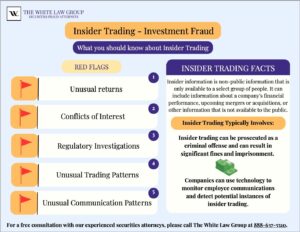What is Insider Information?
Insider information is non-public information that is only available to a select group of people. If your broker is making trades in your account that are unusual or inconsistent with your investment objectives, it could be a sign of insider trading. Insider information may include news about a company’s financial performance, upcoming mergers or acquisitions, or other information that is not available to the public.
Is Trading Insider Information Illegal?
Insider trading can be prosecuted as a criminal offense and can result in significant fines and imprisonment. In addition to the legal consequences, it can have other negative consequences such as damaging a company’s reputation and causing investors to lose confidence in the markets.
The Securities Exchange Act of 1934 was the first step in requiring the disclosure of company stock transactions. Directors, executives, or anyone else who has information or who holds more than 10% of any class of a company’s securities are considered insiders by the SEC. Anyone who becomes an insider must file SEC Form 3, Initial Statement of Beneficial Ownership of Securities, within 10 days of assuming an insider role.
If an insider makes a transaction, they must file Form 4, Statement of Changes in Beneficial Ownership, within two business days of making the transaction. This form serves to notify the public that an insider acted on a security.
Trading on insider information is a bad idea because it is illegal and unethical. It gives an unfair advantage to those who have access to the same information and can harm other investors who do not have access to that particular intelligence.
High-Profile Insider Trading Cases
In 2004, Martha Stewart was convicted of insider trading for selling shares of ImClone Systems just before the stock price plummeted. Stewart was charged with securities fraud, obstruction of justice and conspiracy. Stewart insisted that she had an agreement with her stockbroker to sell shares if they dropped below a certain price. She received a five-month prison sentence and a two-year probation.
In 2013, Steve Cohen, the founder of SAC Capital Advisors, was charged with insider trading. He was not convicted of any wrongdoing, but his firm was forced to pay a $1.8 billion fine. The charges stemmed from allegations that Cohen failed to supervise his employees, who were accused of trading on insider information. This case was one of the largest of its kind and it led to the closure of SAC Capital Advisors.
Is Your Broker Engaging in Illegal Insider Trading?
If your broker is engaging in insider trading, there are several red flags and signs that you should be aware of to assist with the situation.
- Unusual Trading Patterns: If your broker is making trades in your account that are unusual or inconsistent with your investment objectives, it could be a sign that they are trading on insider information.
- Unusual returns: If your account is generating returns that are significantly higher than the market average, it could be a sign that insider trading is occurring.
- Unusual Communication Patterns: If your broker is communicating with you more frequently than usual, or if they are providing you with information that is not available to the public, it could be a sign that they have access to illegal inside information.
- Conflicts of Interest: If your broker has a personal or professional relationship with an executive or insider at a particular company, it could be a sign they have access to insider information.
- Regulatory Investigations: If your broker is under investigation or has been in the past by regulatory authorities, it could be a sign that they have engaged in illegal activity, therefore it is recommended to proceed cautiously.
If you suspect that your broker is engaging in insider trading, it is important to report your concerns to the appropriate authorities, such as the Securities and Exchange Commissions (SEC) or the Financial Industry Regulatory Authority (FINRA). You can also speak with an experienced securities attorney to learn more about your legal options.
If you notice these red flags, it may be a sign that your broker or financial advisor is engaging insider trading. It is important to take action to protect your investments and financial well-being.
How Does FINRA Help with Insider Trading?
FINRA (Financial Industry Regulatory Authority) plays an important role in preventing insider trading. FINRA is a non-governmental organization that regulates the activities of broker-dealers in the United States. One of FINRA’s primary responsibilities is to enforce rules and regulations related to insider trading. FINRA monitors trading activity to identify potential instances of insider trading and investigates any suspicious activity.
If FINRA determines that a broker dealer has engaged in insider trading, it can impose fines, suspend or revoke licenses, and take other disciplinary actions. In addition to its enforcement activities, FINRA also provides guidance and education to broker-dealers to help them comply with trading regulations.
Do I need a Securities Fraud Attorney?
FINRA arbitration serves as a dispute resolution process specifically tailored for resolving conflicts between brokers and their customers, as well as disputes among brokers themselves.
The White Law Group’s FINRA arbitration attorneys have handled over 700 FINRA arbitration claims involving unauthorized trading, unsuitable investments, fraud, negligence, churning/excessive trading, and improper use of margin. The White Law Group, LLC is a national securities fraud, securities arbitration, investor protection, and securities regulation/compliance law firm with offices in Chicago, Illinois and Seattle, Washington.
Free Consultation
If you are concerned about insider trading, the securities attorneys at The White Law Group may be able to help you. For a free consultation with a securities attorney, please call the firm’s office at 888-637-5510. For information on The White Law Group and its representation of investors in securities claims, visit https://whitesecuritieslaw.com.
Last modified: March 6, 2024



